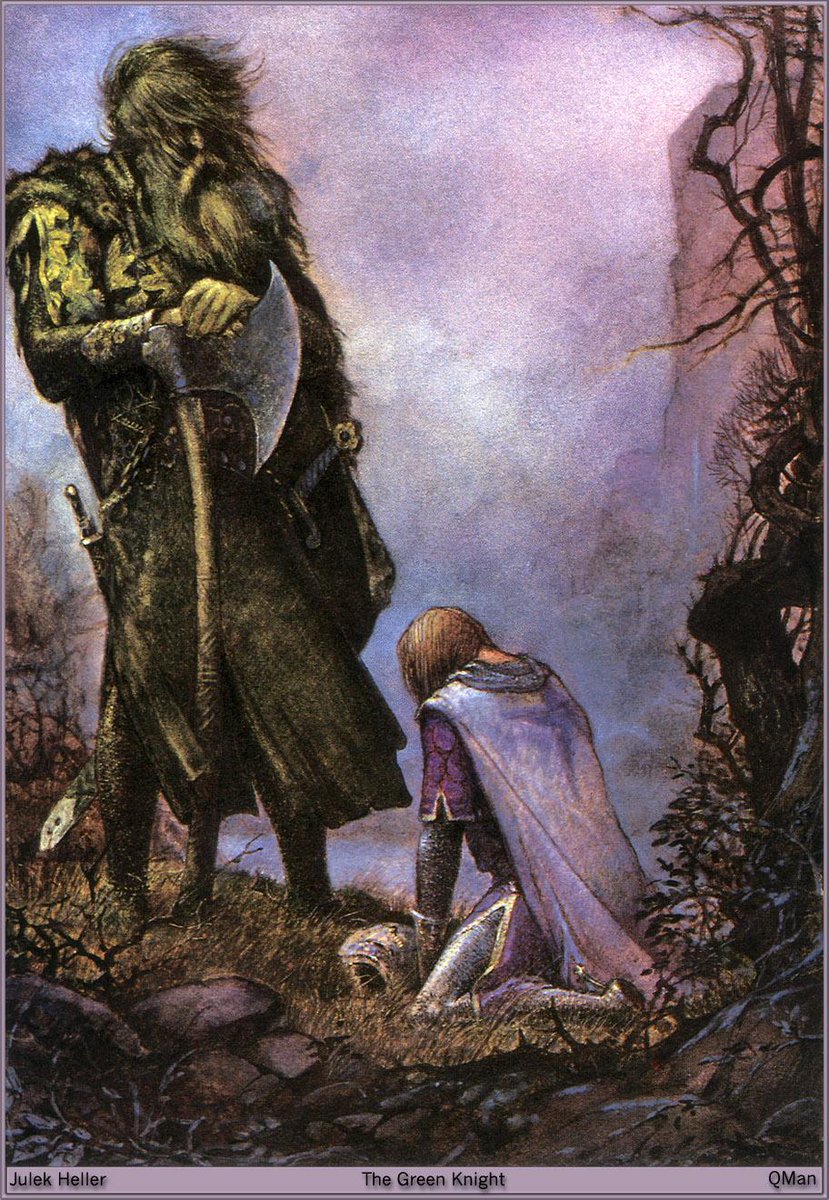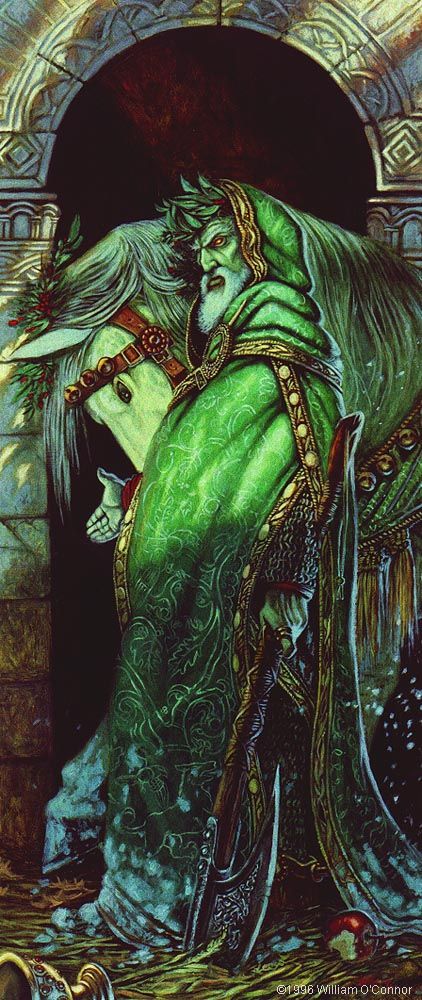I would be remiss to pick just one part of Gawaine's famed tale to do so I'm going to do a loose thread with occasional tangents on Sir Gawaine and the Green Knight, my favorite Arthurian legend.
Let's do some background first. S
Let's do some background first. S
Sir Gawaine and the Green Knight is a 14th century tale of the Knights of the Round Table and of the court of King Arthur. It borrows heavily from Celtic myth, with elements of Irish Cuchulainn and Welsh Pwyll in different parts. Written in Middle English, it is anonymous.
Like many tales this is a vague backdrop, an attachment to the presumed cycle of choice for many. Arthur and Guinevere and Morgan le Fay feature but Gawaine is the focus, here as Arthur's young nephew and new addition to the Round Table.s
Symbolism runs rampant. Green is very English here, a color of nature, but in Celtic tradition the color of death: the two mix seamlessly. Gold, too, represents the end of youth and purity.
The pentagram, though, is the chief symbol, and five the chief number along with three.
The pentagram, though, is the chief symbol, and five the chief number along with three.
A pentagram here is an endless symbol, each point representing one of Christ's five wounds. Gawaine wears it on his shield, for good luck, and the symbol is unabashedly tied to Solomon and Michael.
So suck it, 1980s evangelicals.
So suck it, 1980s evangelicals.
The story is rich in allegory and alliteration, in and out of translation to modern English. It comes down to us only by luck, and thank God it did. I cannot reproduce that, not here anyway.
Seasons and holidays are also important: and that's where we begin. New Years' Day
Seasons and holidays are also important: and that's where we begin. New Years' Day
Arthur is receiving the court and gifts, a fairly typical thing. The court is established, the Round Table has its knights, and its newest is young untested Gawaine.
Unexpectedly at the feast, the doors come busting down and a giant on a horse shows up with an axe and holly.
Unexpectedly at the feast, the doors come busting down and a giant on a horse shows up with an axe and holly.
The Green Knight has come! No one has heard of him, so he proposes a game of wounds, a tit-for-tat. Except, the wound is beheading. The prize? His axe.
Gawaine, knowing his uncle is important and being a young dude, offers to play the game. The Knights lets him go first.
Gawaine, knowing his uncle is important and being a young dude, offers to play the game. The Knights lets him go first.
Gawaine's cut is clean, and the Green Knight's head is removed. He does not fall, but picks up his chatty head and shows it to Guinevere specifically.
In one year and a day, at the Green Chapel, Gawaine must prove his valor by showing up and receiving his wound. He rides off.
In one year and a day, at the Green Chapel, Gawaine must prove his valor by showing up and receiving his wound. He rides off.
Gawaine has no idea where the Green Chapel is, but heads off: a quest is a quest! Much of the next year is alluded to, battles and adventures, but is off-panel for readers. Maybe there are specific tales but like this tale was almost, they are lost to us.
Winter is coming.
Winter is coming.
Gawaine still has not located the Green Chapel, but in desperation as New Years approaches he comes to the castle of one Bertilak de Hautdesert, who offers to make Gawaine his guest. He even knows where the Chapel is!
But he doesn't live alone, of course.
But he doesn't live alone, of course.
The Lord of the Castle has a lady, and she is hot. Super hot. Hot enough to tempt a young man who is supposed to chivalrous, but at this point acknowledging her beauty is a courtly virtue.
But from the get-go she's making bedroom eyes at Gawaine.
But from the get-go she's making bedroom eyes at Gawaine.
Aside from servants, the castle has one other guest. An old woman with sass to rival any Gawaine has ever met, and the two exchange words more than once. She more challenges him than anything, questioning his moral high ground and valor.
Stop me if you can guess who she is.
Stop me if you can guess who she is.
Before he will reveal the path to the Chapel, because Gawaine has a few days, the Lord offers to let Gawaine rest after his many quests and stay while he goes hunting: when he returns, he will give Gawaine whatever he caught, while Gawaine gives him whatever he received.
Cool?
Cool?
The first day Gawaine finds himself beset upon: the Lady has intentions for his loins. Gawaine declines, but not wanting to offend, accepts a single kiss.
The Lors returns from his hunt, gives Gawaine the hunt; Gawaine gives him the kiss. He doesn't say who it's from.
The Lors returns from his hunt, gives Gawaine the hunt; Gawaine gives him the kiss. He doesn't say who it's from.
The second day she comes back with no less than the same intentions, but still not wanting to offend, accepts two kisses.
Repeat: Lord returns, Gawaine gives him two kisses but does not say who they're from.
Repeat: Lord returns, Gawaine gives him two kisses but does not say who they're from.
The third day, she comes with intentions and gives him three kisses; she also has a magic green and gold girdle/sash that prevents the wearer from wounds.
The lord returns and gets three kisses.
He does not get the sash. Gawaine keeps that.
The next day he heads off.
The lord returns and gets three kisses.
He does not get the sash. Gawaine keeps that.
The next day he heads off.
Finding the Green Chapel a mere two hours away, Gawaine keeps his date and arrives first. The Chapel is abandoned and wild.
He doesn't have to wait for long. The giant cometh.
He doesn't have to wait for long. The giant cometh.
The Green Knight appears much as he did, head reattached, and asks if Gawaine is ready. He is, and submits himself to the axe.
When the blow comes, he flinched.
 : J. Howe
: J. Howe
When the blow comes, he flinched.
 : J. Howe
: J. Howe
The Green Knight chastises him: is he not a Knight of the Round Table? Where is his valor? So Gawaine submits himself again and this time as the blow comes down, it stops just at his skin: he passed that test.
There is yet a third blow.
 : J. Heller
: J. Heller
There is yet a third blow.
 : J. Heller
: J. Heller
This one connects; but leaves only a slight wound, for Gawaine was wearing the green and gold girdle as a scarf: but why did it cut him?
Because, explains the Green Knight, he withheld the truth from his host.
Oh, and the Green Knight? He was that host.
Because, explains the Green Knight, he withheld the truth from his host.
Oh, and the Green Knight? He was that host.
The whole thing was a test, set up by the old lady. Who isn't old at all. She is, in fact, Morgan le Fay.
One year ago, she sent an enchanted Lord de Hautdesert to Arthur's court to test them, and if decapitated, to show his head to Guinevere so she would die of fright.
One year ago, she sent an enchanted Lord de Hautdesert to Arthur's court to test them, and if decapitated, to show his head to Guinevere so she would die of fright.
Gawaine was tested separately, for the Lord commanded his wife to seduce Gawaine and test his virtue. And he passed, up to the point he kept the girdle for himself. By deceit, Gawaine failed.
But only in part.
 : W. O'Connor
: W. O'Connor
But only in part.
 : W. O'Connor
: W. O'Connor
Gawaine has proven himself the best of Arthur's knights: he stood up to the challenge and defended his king's honor in the face of certain death. When offered even a fraction of a chance to escape that death, he proved himself human but not craven: a true knight admits his flaws.
So, Gawaine parts, and wears the girdle-sash upon his return to court. He tells his tale and so moved is the court that the sash becomes vogue in court: everyone wears the green-gold sash!
Hail Gawaine!
So ends the tale; but I think there's more to this ending.
Hail Gawaine!
So ends the tale; but I think there's more to this ending.
Gawaine wears the sash because he feels his virtue has diminished, and he does this as penance.
Everyone else does it in solidarity, like a pink ribbon for breast cancer or black at a funeral.
To me, this diminishes the meaning of Gawaine's penance. It's a tragic irony.
Everyone else does it in solidarity, like a pink ribbon for breast cancer or black at a funeral.
To me, this diminishes the meaning of Gawaine's penance. It's a tragic irony.
There's so much to explore with such a tale, and giants like Tolkien have even done their own translation and analysis, so I suggest looking there for further analysis.
Hail Gawaine? Hail indeed.
Hail Gawaine? Hail indeed.

 Read on Twitter
Read on Twitter





